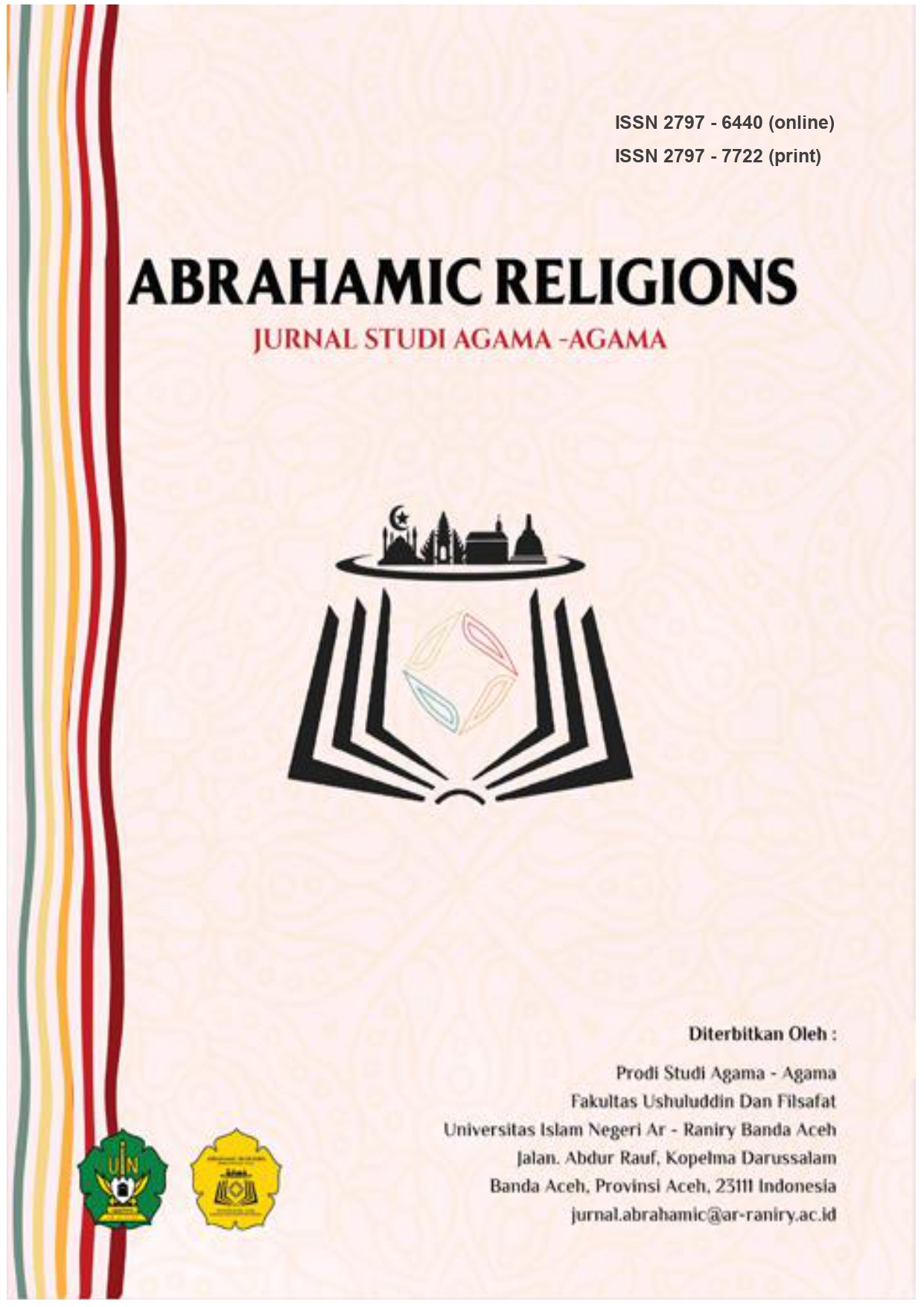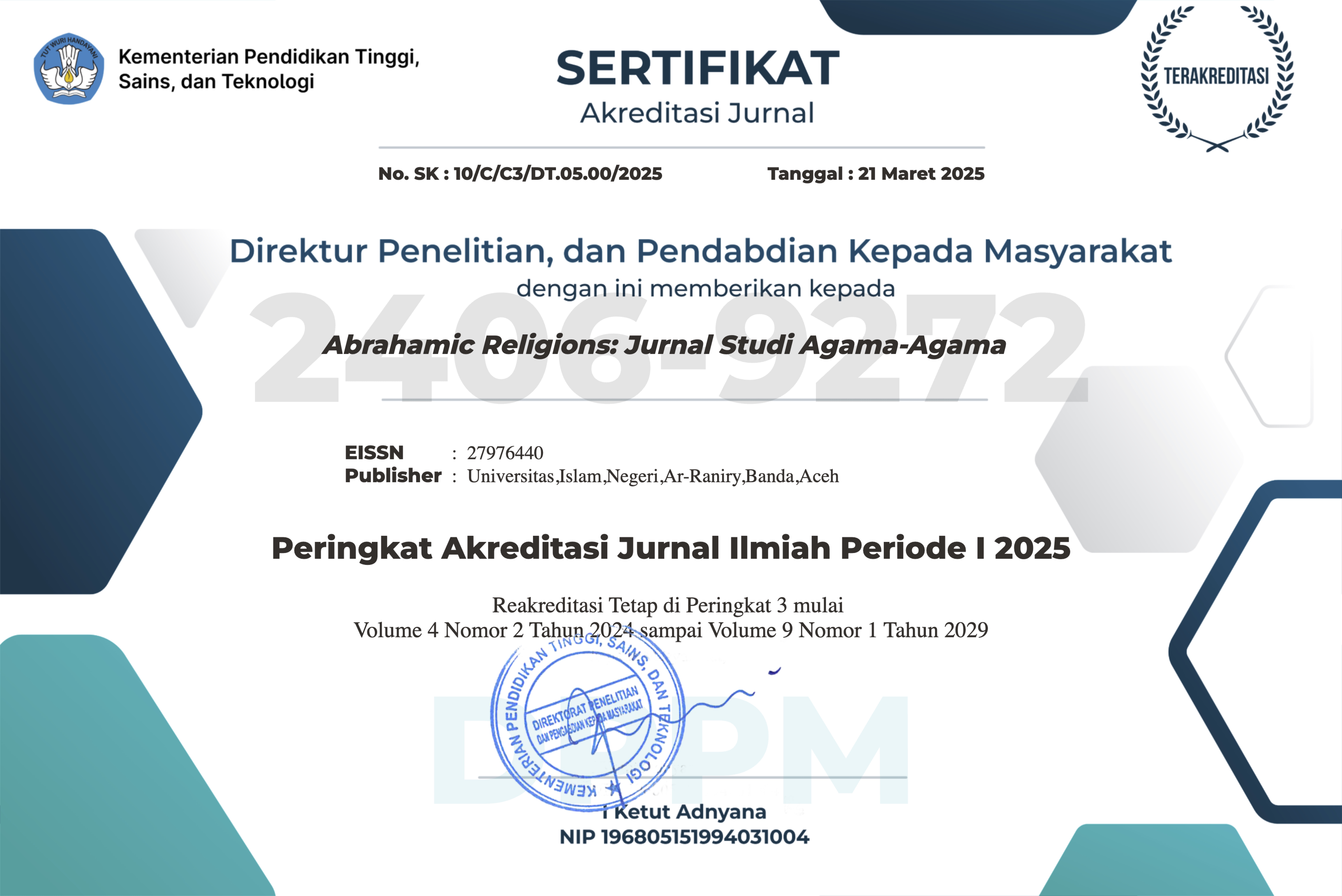Theological Pluralism: Exploring Religious Expressions within The Baha'i Community in Kubu Raya
DOI:
https://doi.org/10.22373/arj.v3i2.20248Keywords:
Theological Pluralism, Religious Diversity, Baha'i CommunityAbstract
This research illustrates the vulnerability experienced by contemporary society in practicing religious beliefs, necessitating the emergence of Theological Pluralism as a new innovation to provide space for minority communities such as the Baha'i to express their religious beliefs. The objective of this study is to elucidate the expressions and responses of the community towards the Baha'i community in Kubu Raya, viewed through the lens of Theological Pluralism. The research employs a qualitative approach rooted in sociology, incorporating literature review and field research. Data collection methods include observation, previous research, and relevant data pertaining to this study. This study indicate that the Baha'i community expresses its beliefs through social interactions viewed from the perspective of Theological Pluralism, ultimately fostering attitudes of tolerance, inclusivity, and appreciation for diversity within pluralistic societies. The community's response to the Baha'i varies, with some exhibiting positive acceptance and others displaying negative rejection. Factors influencing these responses involve limitations in religious knowledge and the socio-political dynamics impacting religious domains.
References
Adha, M. M., & Susanto, E. (2020). Kekuatan Nilai-nilai Pancasila dalam Membangun Kepribadian Masyarakat Indonesia. Al-Adabiya: Jurnal Kebudayaan Dan Keagamaan, 15(01), 121–138. https://doi.org/10.37680/adabiya.v15i01.319
Apriliyadi, I. (2020). Strategi Komunikasi Penganut Agama Baha’i dalam Membangun Citra Positif di Masyarakat. Al-Mada: Jurnal Agama, Sosial, Dan Budaya, 3(2), 151–169. https://doi.org/10.31538/almada.v3i2.719
Arifianto, Y. A., Suseno, A., & Kristiyono, P. (2021). Aktualisasi Misi dalam Pluralisme Agama-Agama di Era disrupsi. Xairete: Jurnal Teologi Dan Pendidikan Kristiani, 1(1), 1–14. http://sttkai.ac.id/e-journal/index.php/xairete/article/view/1
Armayanto, H. A., Kubro, S. K., & Kusuma, A. R. (2022). Telaah Kritis Konsep Tuhan Dalam Agama Baha’i : Sebuah Tren Baru Pluralisme Agama. Jurnal Religi : Jurnal Studi Agama-Agama, 18(2). https://doi.org/https://doi.org/10.14421/rejusta.2022.1802-06%20%20
Bahá’í International Community. (n.d.). Bahá’í Principles. Bahá’í. International Community.
Cupitt, D. (2002). Is nothing sacred? : the non-realist philosophy of religion : selected essays. In Perspectives in continental philosophy (Issue no 28). Selected Essays. SCM Press.
D’Costa, G. (2006). Theology and Religious Pluralism: The Challenge of Other Religions. Wiley-Blackwell.
De Vries, H. (2017). Handbook of Religion and the Asian City: Aspiration and Urbanization in the Twenty-First Century. Springer.
Fata, A. K. (2018). Teologi Pluralisme Agama Di Indonesia. Miqot, XLII(1), 105–128.
Havis Aravik, & Choiriyah, C. (2016). Islam dan Pluralisme Agama. Mizan: Journal of Islamic Law, 4(2). https://doi.org/https://doi.org/10.32507/mizan.v4i2.184
Hick, J. (1989). An Interpretation of Religion: Human Responses to the Transcendent. Yale University Press.
Hidayat, S. (2017). Stereotip Mahasiswa IAIN Pontianak terhadap Agama Baha’i. Religió: Jurnal Studi Agama-Agama, 7(1), 55–83. https://doi.org/10.15642/religio.v7i1.703
Huberman, A. M. (2005). Qualitative Data Analysis (terjm. Tje). UI-Press.
Hyangsewu, P., & Lestari, W. (2022). TEOLOGI INKLUSIF SEBAGAI RESOLUSI KONFLIL AGAMA DI ERA DIGITAL. Zawiyah: Jurnal Pemikiran Islam, 8(1), 39. https://doi.org/10.31332/zjpi.v8i1.3558
Isnawati. (2016). Manusia: Antara Kebutuhan Doktrin Agama dan Inklusivitas Beragama. Batusangkar International Conference I, October, 449–450.
Kaufman, G. D., & Cobb, J. B. (1983). Toward a Mutual Transformation of Christianity and Buddhism. Beyond Dialogue. Buddhist-Christian Studies, 3, 174. https://doi.org/10.2307/1389931
Knitter, P. F. (2002). Introducing Theologies of Religions. Orbis Books.
Knitter, P. F. (2008). Without Buddha I Could Not Be a Christian. Oneworld Publications.
Lubis, A. A. A. M. R., & Sulaiman. (2022). The Politics of Recognition, Society, and Law: The Role of Muslim Society and the Kubu Raya Local Government in the Struggle of the Baha’is. Millah: Journal of Religious Studies, 21(3), 915–946. https://doi.org/10.20885/millah.vol21.iss3.art11
Majelis Rohani Nasional. (2015). Agama Baha’i. Majelis Rohani Nasional Baha’i Indonesia.
Masduki, H. (2018). PLURALISME DAN MULTIKULTURALISME DALAM KERANGKA KERUKUNAN ANTAR UMAT BERAGAMA PERSPEKTIF AL-QUR’AN (Telaah dan Urgensinya dalam Kajian Filsafat Sosial). El-Furqania : Jurnal Ushuluddin Dan Ilmu-Ilmu Keislaman, 4(01). https://doi.org/10.54625/elfurqania.v4i01.3127
Momen, M. (2009). The Bahá’í Faith: A Short Introduction. Oneworld Publications.
Muhammad War’i. (2015). Horison Pragmatic Pluralism sebagai Paradigma (berbahasa) Penumbuh Inklusivitas Beragama: Analisis Bahasa Keagamaan dalam Film Negeri Tanpa Telinga. Harmoni: Jurnal Multikultural & Multireligius, 14(2), 46–54.
Noer, A. (2019). PLURALISME AGAMA DALAM KONTEKS KEISLAMAN DI INDONESIA. RELIGI JURNAL STUDI AGAMA-AGAMA, 15(1), 51. https://doi.org/10.14421/rejusta.2019.1501-04
Rizaldy, Y., & Suyanto, T. (2020). Strategi Penganut Agama Baha’I Di Kota Surabaya Dalam Mempertahankan Eksistensinya. Kajian Moral Dan Kewarganegaraan, 8(2), 231–245.
Rojiati, U. (2019). Manajemen Komunikasi Sosial Penganut Agama Baha’i di Kota Bandung. Communicatus: Jurnal Ilmu Komunikasi, 3(1), 1–16. https://doi.org/10.15575/cjik.v3i1.5033
Ronaldo, R., & Wahyuni, D. (2022). Keniscayaan Inklusivisme dan Kedewasaan Beragama Untuk Indonesia Damai. Jurnal Ilmu Agama: Mengkaji Doktrin, Pemikiran, Dan Fenomena Agama, 23(1), 95–106. https://doi.org/10.19109/jia.v23i1.13024
Rosyid, M. (2021). Optimalisasi Whatsapp Grup Lintas Agama Dalam Mengokohkan Jaringan Sosial Umat Baha’I Di Desa Cebolek Kidul, Pati, Jawa Tengah. Jurnal Sosiologi Reflektif, 16(1), 171. https://doi.org/10.14421/jsr.v16i1.2125
Sacks, J. (2004). The Dignity of Difference: How to Avoid the Clash of Civilizations. Continuum International Publishing Group.
Setiawan, A. (2018). Apologetika Prasuposisional Triperspektivalisme John M. Frame dan Aplikasinya terhadap Pemikiran Kristen Pluralis tentang Pluralisme Agama di Indonesia. Veritas: Jurnal Teologi Dan Pelayanan, 17(1), 61–80. https://doi.org/10.36421/veritas.v17i1.306
Smith, H., & Smith, H. (1991). The world’s religions : our great wisdom traditions. Harper One.
Sukmayadi, Q. M. A., & Hyangsewu, P. (2022). Virtual Religious EduTour: Penguatan Inklusivisme Beragama melalui Wisata Desa Pancasila. Jurnal Ilmiah Sosiologi Agama (JISA), 5(1), 53. https://doi.org/10.30829/jisa.v5i1.11675
Veeger, K. J. (1993). Realitas Sosial, Refleksi Filsafat Sosial atas Hubungan Individu-Masyarakat. Cakrawala Sejarah Sosiologi. Jakarta: PT Gramedia Pustaka Utama.
Zamakhsari, A. (2020). Teologi Agama-agama Tipologi Tripolar; Eksklusivisme, Inklusivisme dan Kajian Pluralisme. Tsaqofah, 18(1), 35. https://doi.org/10.32678/tsaqofah.v18i1.3180
Downloads
Published
Issue
Section
License
Authors who publish in this Journal agree to the following terms:
- Authors retain copyright and grant the journal right of first publication with the work simultaneously licensed under Attribution-ShareAlike 4.0 International (CC BY-SA 4.0) allows others to share the work with an acknowledgment of the work's authorship and initial publication in this journal.
- Authors are able to enter into separate, additional contractual arrangements for the non-exclusive distribution of the journal's published version of the work (e.g., post it to an institutional repository or publish it in a book), with an acknowledgment of its initial publication in this journal.
- Authors are permitted and encouraged to post their work online (e.g., in institutional repositories or on their website) prior to and during the submission process, as it can lead to productive exchanges, as well as earlier and greater citation of published work. (See The Effect of Open Acces)















